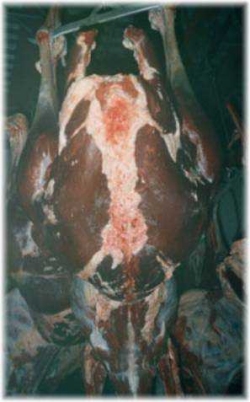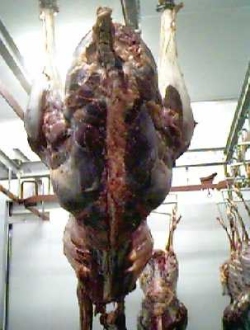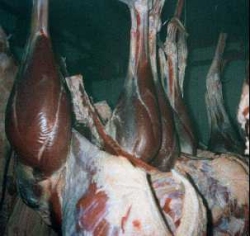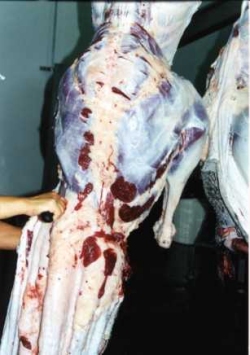
Photo 1 - Blue Mountain Fed Carcass - 1 yr of age

Photo 1
is the carcass of a bird that was on a dedicated Blue Mountain Feeding
program. This bird was 12 months of age at processing. The carcass
weighed in at 155 lbs. (70.5 kgs). It yielded 105.4 lbs (47.9 kgs) in
boneless meat.
Note the WIDTH of the carcass across the back, the fullness of the leg
muscles and the fullness of the thigh muscles. The thigh muscles
contain ALL of the high end cuts such as filets and steaks and this
bird yielded a very high percentage of filets and steaks compared to
trim meat.
Also note the COLOR of the meat on the carcass. It is deep RED with
muscles bulging in every direction. The membrane covering the carcass
is translucent which indicates a high quality feeding program and a
very healthy bird.
The fat strip on the back was less than 1/2 inch thick and snowy white.
This thickness and color is excellent and correct for a high quality
meat bird such as this one.
Using the Blue Mountain Ostrich Carcass Grading & Yield System,
the meat shown in Photo 3 would clearly be graded as a "PRIME GRADE"
carcass and will result in a high quality meat products to be offered
to our consumers.
Photo 2 - A Generic Fed Carcass - 1 year of age

The
feeding program of the carcass in Photo 2 is unknown. The weight of the
carcass and the cutting percentages are also unknown.
Note the color of the meat--multicolored throughout with very poor
muscling. The width of the carcass is very narrow with the leg and
thigh muscles showing bare minimal growth and there actually appears to
be some muscle deterioration on the lower thigh muscles.
The fat strip on the back is nearly non-existent and very yellow in color.
No matter how inexpensive the feeding program was on this bird, it is
not a cost effective bird to raise as the yield of boneless meat will
be very low and the meat quality very poor.
Using the Blue Mountain Ostrich Carcass Grading & Yield System,
the meat shown in Photo 2 would clearly be graded as a "UTILITY GRADE"
carcass and none of the meat should be offered to our consumers as filet or steak.
Photo 3 - Blue Mountain Fed Carcass - 1 yr of age

Photo 3 is a group of Blue Mountain fed Ostrich carcasses. These carcasses are all of good size and even consistency.
Again, note the deep RED coloring of the leg muscles shown in this photo.
The leg muscles show excellent growth and bulging. You can clearly
ascertain in this photo the membrane seam lines between the inside,
outside, and mid-leg (drum) muscles.
Also note that the fat color on the body, closest to the camera and
flash, is snowy white--the way it should be. This is also a strong
indication of a very healthy bird that produced high quality meat.
Using the Blue Mountain Ostrich Carcass Grading & Yield System,
the meat shown in Photo 3 would clearly be graded as a "PRIME GRADE"
carcass and will result in a high quality meat products to be offered
to our consumers.
Photo 4 - A Generic Fed Carcass - unknown age

Shown in
Photo 4 is an Ostrich carcass hanging by wings with legs down. This
photo clearly shows some nutritional problems this bird was having.
Note the narrow width across the back. The fat strip on the back is nearly non-existent.
This carcass also shows very poor muscle growth--minimal at best. This
type of carcass is very common in the industry and clearly shows birds
on feeding programs that are less than desireable for cost effective
meat production.
It is hard to say how this bird will grade from the photo, but am told
the meat was multi-colored. However, from other outside appearances, it
appears that this was not a well-fed bird, or it had some feed
conversion problems while growing, and it can be clearly suspected that
this bird is definitely a "UTILITY GRADE" carcass and should not be
used for Filets or Steaks.